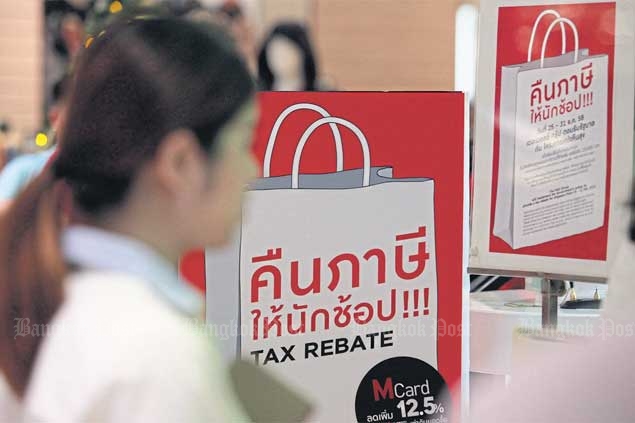
Even though it is just the first month of 2016, the time is right to review your personal income tax payments. Advance planning can help individual taxpayers avoid paying excessive bills and save more hard-earned money.
Individuals earning up to 240,000 baht a year or 20,000 baht a month in Thailand are tax-exempt, while those with higher income pay various tax rates ranging from 5% to 35%.
As tax planning is a year-round process, taxpayers can add up deductible expenses paid during the year or delay receiving extra income to avoid having to pay larger tax bills, as the amount is levied at each person's top bracket.
A common mistake is to not claim back tax from these deductible expenses, according to Chatpong Watanajiraj, vice-president of Kasikornbank's consumer advisory fulfilment department.
"Tax planning is an important thing because it can prevent taxpayers from overspending on deductible expenses or even forgetting to spend on these items," he says.

A sign at a shop in a department in Bangkok ensures that consumers can receive tax rebate if purchased goods at the shop. The government allows taxpayers to deduct up to 15,000 baht paid for domestic tour purchases or hotel accommodation last year and another 15,000 spent on goods and services during the last seven days of 2015. PANUPONG CHANGCHAI
Standard tax-deductible expenses
Each taxpayer is eligible to deduct up to 30,000 baht for a personal allowance a year from taxable income, and he or she can deduct up to 40% of annual income but not exceeding 60,000 baht for annual expenses.
In addition, their contribution to the social security fund with a maximum amount of 9,000 baht a year is tax-deductible.
Workers can deduct 15,000 baht per child for a maximum of three children as child allowances and another 2,000 baht educational allowance for each child for those studying in Thailand's schools or universities.
The allowance for a non-working spouse is capped at 30,000 baht.
Taxpayers with parents aged over 60 and earning less than 30,000 baht a year can claim 30,000 baht for each parent as an allowance, and 60,000 per disabled or incapacitated person who the taxpayer takes care of. The same amount and conditions apply to the parents of a non-working spouse.

Specific allowances
Provident and pension funds
Individual taxpayers' contributions to provident and pension funds are tax-deductible at a maximum of 500,000 baht a year. However, the ceiling must take into account investment in retirement mutual funds (RMFs) and premiums of pension life insurance policies.
If a taxpayer's contribution to such retirement funds still has room for tax deductions, raising the contribution will take advantage of higher tax benefits and boost the retirement nest egg.
Employees of private companies are allowed to contribute more to provident funds than their employers but the ceiling is capped at 15% of salary.
Tax-saving mutual funds
Investments in long-term equity funds (LTFs) and RMFs qualify for tax relief. Taxpayers can deduct contributions to LTFs worth up to 500,000 baht but no more than 15% of annual taxable income, whichever is lower. The same contribution limit is also applied to RMFs but the amount put in must not exceed 500,000 baht per tax year.
Taxpayers with budget constraints should consider investing in LTFs before RMFs. This is because LTF contributions are required by law to be locked up for five calendar years but, in practice, the period can be just over three full calendar years when buying the units at the end of the year and redeeming them early in the fifth year. Contributions to RMFs are redeemable only when holders turn 55.
Even though the loophole in the LTF lock-up period will be plugged from next year, these investments are still preferable as holders are not required to put money into the fund every year, while investors in RMFs are required to contribute a minimum 5,000 baht at least every other year.
"When compared with RMFs, LTFs should be the priority for investment as their lock-up period is shorter," says Mr Chatpong.
Life insurance
The maximum deductible amount paid for premiums of life insurance policies held by income earners is 100,000 baht, but the amount is even more if they take out a pension life insurance policy. A life insurance policy that qualifies for tax deduction must have at least a 10-year term.
Payments for premiums of pension life insurance policies are tax-deductible up to 200,000 baht, but the amount plus contributions for RMFs and provident or pension funds must not exceed 500,000.
Health insurance premiums of up to 15,000 baht paid for each parent of the taxpayer are tax-deductible.
Interest on mortgages
Taxpayers with mortgages should include this tax deduction, which can lower tax liability by tens of thousands of baht. Interest on mortgages with a maximum amount of 100,000 baht offers savings on personal income tax.
Charitable donations
Charitable cash contributions to qualified foundations or schools can be deducted from income tax. Donations to educational institutions can be powerful tax write-offs but must not exceed 10% of taxable income.
Monetary donations to specific charities are also deductible but at no more than 10% of taxable income.
Most importantly, don't forget to get receipts for any donations to be used when filing tax returns.

Tax credits on dividends
Shareholders can get a double windfall from dividend payments and pay less personal income tax from tax credits on dividends.
Dividend tax credits are implemented to address the double taxation problem. A company pays corporate taxes on those earnings and takes a portion of the money after tax to directly pass to shareholders as dividends that are taxed again.
Mr Chatpong says only low and middle-income earners can take advantage of such benefits because they pay a lower rate of tax than companies paying the dividends.

Customers thong at a watch shop in a department store. The Finance Ministry is offering deductions to individual taxpayers for goods and services worth up to 15,000 baht of their spending during the last week of 2015. PANUPONG CHANGCHAI
Deferring income
Taxpayers can delay taking extra income such as lump sums on retirement or severance payments until the next tax year if they expect to earn lower income during that year to avert paying excessive tax bills.
Such income manipulation can work both ways. If you anticipate your top tax bracket will be higher next year, you might want to advance any extra income into the lower-earning year to shoulder less tax. Each additional baht earned is taxed at the taxpayer's top rate.
Tax returns for couples
Mr Chatpong recommends couples with one spouse earning low or no income but having high tax-deductible expenses to file a joint tax return because advantages from higher tax deductions will outweigh the impact from larger taxable income.
Separate tax filing is a smart choice when both spouses are in the same tax bracket.
Additional income should be filed by spouses who have less income to reduce tax bills.
When filing tax returns for the 2015 tax year, which can be done until April 8, earners should not forget to claim travel and shopping tax deductions.
The government allows taxpayers to deduct up to 15,000 baht paid for domestic tour purchases or hotel accommodation last year and another 15,000 spent on goods and services during the last seven days of 2015. However, invoices issued by shops registered under the value-added tax system must be shown as proof.